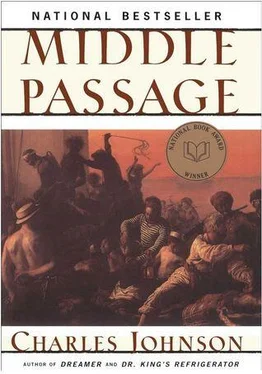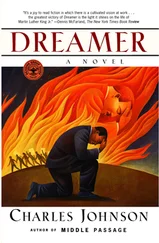Few mates wanted to share his company. Some nights he would step up timidly behind a circle of joking men, there in Bangalang, and instantly feel them stiffen, grow silent, then shuffle off to other business. Or he would hover at the periphery of his foremast hands as they worked, fingers shoved into his waistcoat like a new boy at school, hoping they would invite him into their banter about work and women. But no one did. They knew better. They were common folk. Most could not read, in contrast to Falcon, a polyhistor who spent twenty hours a week pouring over old tomes when the weather was fair — this, because as captain he could not bear having anyone, especially his first mate, correct him. He and Cringle argued bitterly, of course, about his pushing the crew too hard. Some nights their shouting in Falcon’s quarters could be heard by all on watch. It became clear, by and by, that as in a house divided at the helm where both parents bicker, the crew benefited by keeping the officers at odds. If Falcon denied extra rations, Cringle might approve them. If Falcon brushed off a lighthand’s complaints of feeling poorly, the mate might let him lie abed. Still, the skipper needed an audience. Try as he might, he could not win what he wanted most once. We landed in Africa: the loyalty of his crew. Thus, he had few allies. Only hypocritical lickspittles like Nathaniel Meadows, who smiled in his face for favors and bad-mouthed him behind his back. As you might expect, the crew was perpetually angry and dissatisfied. What was odd in this was that it wasn’t their anger at all — it was Falcon’s. His emotions permeated the ship like the smell of rum and rotting wood, and these feelings — as is always true of groups confined together in small quarters, or of couples — the men picked up, believing the directionless rage they felt to be their own. All this explained (for me) Falcon’s web work of traps, the spring-released darts coated with curare. But little else, for in his concluding entry he spoke of plans to purchase forty Allmuseri tribesmen and something else Ahman-de-Bellah lost five servants capturing, a colossus he felt he could sell for a king’s ransom in Europe. Of this creature, he wrote no more, only noting he could not bring it aboard until the Republic’s carpenters reinforced leg-irons and planking in the hold.
Standing there, peering at these pages to make sure I’d read them right, feeling as though I had fallen into another man’s nightmare, and sweating in the heat of his locked room since no air was circulating, I was so absorbed I failed to hear the doorlatch turn and became aware of company only when air rushed in suddenly, altering the room’s pressure and clogging my left inner ear. My right had a ringing sound. The edges of my eyes felt blurred. Then just as suddenly the sensation was gone and I heard a shrill, adenoidal voice that swallowed most of its soft consonants say, “Whatever you’re lookin’ to steal, ’tis gone.”
“Cap’n,” says I, “this isn’t what it looks like. All I wanted was a lantern. I guess I made a mistake.”
“ ’Deed you have.”
Silhouetted as he was, his wild hair like rope yarn, skin drier than scales, and beard nearly an ell from top to bottom, his face looked, so help me, like five miles of bad Louisiana road. Rum came reeking, like a slap, off his clothing. A gun hung low in his belt. Yet his eyes were in-turned, icy, as he pushed by me into the room, swaying on his feet like a damaged rig, drunk and barely registering my presence at all. He lowered his rump onto the cushion of his chair, one hand squeezing the armrest, the other pressed against his chest; then he lifted his chin slightly, to the left and away from me, to let a belch of volcanic proportions bubble free. “Light a candle, please. And bring me that jug in the corner and a clean cup — bring one for yourself too.” Instantly, I felt ill, but hastened to obey, each step I took causing the doubloons in my crotch to jingle. By rights, he could have me birched or keelhauled or lashed to the capstan bar. But even worse than that, I realized he might lecture me again, beginning as he often did with a personal anecdote that might go on forever, embellishing each line of dialogue and taking every part in the story for my instruction. Even worse, he might decide to demonstrate esoteric Chinese jointlocks he’d learned while living for a year in King Miu village, using me as his hypothetical opponent in lessons that resulted in my neck aching for days thereafter. Carefully, I poured him a cup of merry-go-down. Then I took a step back, gauging my distance from the door.
“Shall I leave now, sir? I’ve found the lantern.”
“D’you now? A lantern, was it? And nothin’ else?”
“On my word.”
Color was climbing high in Falcon’s neck and face. His exhalations were loud, pursive, and again he pressed his palm against his middle, as though mashing down some deep, recurring pain or intestinal burn he’d somehow learned to live with. His face ritched left in a frown. “You weren’t heah to murder me in my sleep and jump ship?”
“No! Of course not, sir!”
“Six men tried that tonight on shore. Not an hour ago, Mr. Calhoun.” His glass empty, he took the jug from me, lifted it and splashed more rum straight down his throat, his whole body shuddering for a second; then his eyes gave me a rum-soaked glare. “I was unarmed, ’cept for these boots I’m wearin’. D’you like ’em?”
“Yessir, and fine boots they are, Cap’n.”
“Naw, you don’t truly see ’em, boy.” He lifted one foot, pointing the toe toward me. “You’re not supposed to! That’s the point of boots like these. The toes are reinforced with steel plates. I’m not a big man, as you may have noticed, and as a lad I was bullied by taller boys. ’Deed, I was. Nary a day passed in my childhood that somebody didn’t single me out for a beatin’ or some cruel jest. Nearly broke me mum’s heart, that did, but I’ll tell you true: Nowadays when I kick a swab’s shins he seldom walks again. I advise you to fix yourself a pair of such useful boots for the voyage back. Have you got a pistol?”
“Nossir.”
“Then we must find one for you.” From among the contents of his chest Falcon selected a 45-percussion Kentucky pistol. “Lovely, isn’t it? I’ve adjusted the sights, added precision rifling in the barrel, and damned if this beauty don’t feature one of my own concoctions. See how heavy the handle is? There’s a magnet inside. It locks down the trigger so no man kin fire it, or snatch it from you, who isn’t wearin’ magnetized rings such as I wear, even when I sleep.” Falcon unscrewed from his third finger, right hand, a metal band, pushed it on my finger, then snapped around my waist a holster of his own design. “You’ll notice,” says he, stepping back to study me, “that spare ammunition fits into three pouches on the sides and the small of your back. The holster has a thumb-break snap, so you kin draw back with one smooth motion to push away your blouse. From now on you’d do well to follow a formula I’ve developed. Every few seconds pat yourself: knife, guns, keys, in that order, to make sure you’ve got everything. A light touch now and then is all it takes; then it’ll become instinctive. I’d advise you not to let any of the blacks get too close when we bring ’em on board—’specially the women. They’ll get right up in your face — they love to do that when talkin’—so keep ’em at arm’s length, with your holster facin’ away from ’em. Don’t eat or drink anythin’ they give you. If you have to shoot one, use small shot ’stead of ball. ’Tis a wee bit more merciful. And when we bring ’em up from below for exercise, work in pairs — Cringle and Meadows, for example. Squibb keeps an eye on Fletcher. And you and me watch out for one another.” His eyes slid up, blinking. “You’re not gonna blow your damned foot off, are you?”
Читать дальше












